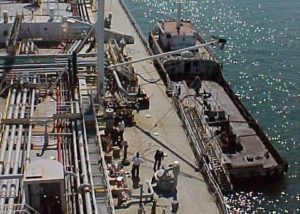 Data collection by ships of their fuel oil consumption will start on January 1, 2019, as decreed by amendments to the International Convention for the Prevention of Pollution from Ships (MARPOL). The amendments entered into force March 1, 2018.
Data collection by ships of their fuel oil consumption will start on January 1, 2019, as decreed by amendments to the International Convention for the Prevention of Pollution from Ships (MARPOL). The amendments entered into force March 1, 2018.
Other important amendments to the MARPOL have also entered into force March 1, covering the classification of garbage, including the addition of a new category of “e-waste,” and amendments to the International Oil Pollution Prevention Certificate, the International Maritime Organization (IMO) said.
The ship fuel oil consumption data reporting requirements are the latest mandatory requirements aimed at enhancing the energy efficiency of international shipping.
“The data collection will begin on 1 January 2019 with data reported at the end of each calendar year to the International Maritime Organization (IMO),” the organization said in a release.
The data collection system is intended to equip IMO with concrete data on fuel oil consumption, which should assist member states in making decisions about any further measures needed to enhance energy efficiency and address greenhouse gas (GHG) emissions from international shipping.
The mandatory requirements were adopted by IMO’s Marine Environment Protection Committee in 2016, through amendments to chapter 4 of annex VI of MARPOL.
Under the new Regulation 22A on collection and reporting of ship fuel oil consumption data, ships of 5,000 gross tonnage and above are required to collect consumption data for each type of fuel oil they use, as well as other, additional, specified data including proxies for transport work. These ships account for about 85% of CO2 emissions from international shipping.
In addition, by December 31, 2018, in the case of a ship of 5,000 gross tonnage and above, the mandatory Ship Energy Efficiency Management Plan shall include a description of the methodology to be used to collect the data and the processes to be used to report the data to the ship’s flag state.
The new mandatory data collection system is the first in a three-step approach to developing a “comprehensive IMO strategy on reduction of GHG emissions from ships” to be adopted in 2023.
In 2011, IMO became the first international body to adopt mandatory energy-efficiency measures for an entire industry sector with a suite of technical and operational requirements for new and existing vessels that entered into force in 2013. By 2025 new ships built will be 30% more energy efficient than those built in 2014.
Other amendments in force
Also entering into force on March 1, 2018 are amendments to MARPOL Annex V on prevention of pollution by garbage from ships. The amendments relate to cargo residues of products which are hazardous to the marine environment and to the Form of Garbage Record Book.
In particular, amendments to Regulation 4 and 6 of Annex V require the shipper to declare whether or not cargo residues are classed as harmful to the marine environment. A new appendix provides criteria for the classification of solid bulk cargoes.
Also, the form of the garbage record book is updated. The Record of Garbage Discharges is divided into Part I for the use of all ships and Part II, required for ships that carry solid bulk cargoes.
A new category of garbage “e-waste” is included. E-waste is defined in the 2017 guidelines for implementation of MARPOL Annex V as electrical and electronic equipment used for the normal operation of the ship or in the accommodation spaces, including all components, subassemblies and consumables, which are part of the equipment at the time of discarding, with the presence of material potentially hazardous to human health and/or the environment.
Amendments to update Form B of the Supplement to the International Oil Pollution Prevention Certificate, in relation to segregated ballast tanks, also entered into force on March 1, 2018.
The IMO is the United Nations agency responsible for regulating the safety, security, and efficiency of shipping and preventing marine and atmospheric pollution from ships.
Photo: Self





